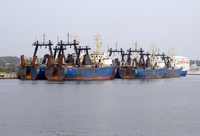 Environmental groups finally achieved, after ten years of lobbying, a global ban on the use of tributyltin (TBT) as a cleaning agent for ships, due to its harmful effects on marine wildlife. Shipping states within the 167-member International Maritime Organization (IMO) ratified the legislation that sealed the ban on all anti-fouling paints which contain TBT, effective next year.
Environmental groups finally achieved, after ten years of lobbying, a global ban on the use of tributyltin (TBT) as a cleaning agent for ships, due to its harmful effects on marine wildlife. Shipping states within the 167-member International Maritime Organization (IMO) ratified the legislation that sealed the ban on all anti-fouling paints which contain TBT, effective next year.
TBT is an organic compound often used as an additive in many marine anti-fouling paints, which kills algal and barnacle growth and anything else that attaches to ships. The problem is that the chemical is highly toxic to marine organisms. Even at low concentrations it causes deformations in oysters and genital changes in snails. The decline of commercial oysters along the Atlantic coast of France and the UK in the 1970s is attributed to TBT contamination.
“This is a tremendous victory for the marine environment,” said Dr Simon Walmsley, Head of the World Wildlife Fund-UK’s Marine Program. “It has been over forty years since TBT’s negative impacts were first identified and seven years since legislation to ban TBT was introduced.”
Panama, which flags one of the world’s biggest shipping fleets, helped bring about the ban. A total of 25 states representing 25 percent of world shipping tonnage had to ratify the IMO’s anti-fouling systems convention to bring the ban into force globally.
The global ban will be introduced in 12 months time. Vessel that have not phased out anti-fouling paints containing TBT will have to begin using a safer alternative. (IMO.org)



















